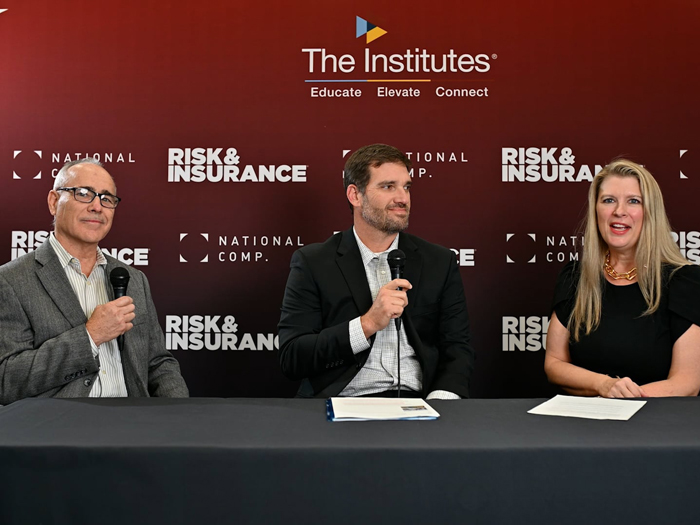Insurance Industry
Investments in Online Insurance Sales Booming

There is a gold rush going on among both start-ups and established insurers to stake a claim in the booming market for online, direct sales of insurance to small and medium-sized businesses.
“We’ve seen the rest of the old economy disrupted over the past decade, first by the internet, then by mobile, while traditional insurance business has marched along largely unchanged, protected by complexity, regulation and inertia,” said Josh Stirling, Boston-based managing director and senior vice president, U.S. insurance, Sanford C. Bernstein & Co.
But with the inexorable advance of technology unlocking the power of big data and inspiring a new wave of customer-centric insurance, he said, many entrepreneurs are looking to disrupt the $250 billion-plus commercial insurance industry market.
Many industry titans, not wanting to be left behind, are pouring money into R&D and big data and deploying capital through strategic venture funds in an attempt to catch up in this market.

Josh Stirling, managing director and senior vice president, U.S. insurance, Sanford C. Bernstein & Co.
“Insurance companies are up against serious existential challenges as increased market disruption continues,” wrote the authors of a new Deloitte Center for Financial Services report.
“If insurers don’t re-invent themselves in fundamental ways, they stand to lose significant market share to new players.”
Sabitha Majukumar, UK-based senior research analyst, worldwide insurance strategies at IDC Financial Insights, said, “Third-platform technologies — mobile, social, cloud and big-data — are paving the way for small-business insurers to establish a direct connection with consumers in a market once exclusively dominated by intermediaries.
“With a clear shift in consumer preferences to buy online, insurers are presented with a great opportunity to complement their existing distribution system with online sales.”
IDC’s recent report, “MaturityScape: Digital Transformation in Insurance” noted that success in such ventures “depends on offering an omni-channel model where simple, transparent and configurable products are sold through company websites, mobile channels or aggregator sites with an option to also connect to an insurer’s contact center or agent for after-sales queries and service.”
New Companies Sprouting Up
As a sign of changing times, an impressive amount of new capital is invested in start-ups in this space: $13 million in venture funds going to Next Insurance in March, $2 million in start-up money from a number of angel investors for New York-based CoverWallet also in March, and $2 million in seed money for just-launched Bunker of San Francisco.
Add to this investments in their own operations by such big players as Berkshire Hathaway, The Hartford, and AIG (as part of a joint venture).
That’s in addition to those from the initial pioneers of selling insurance to small businesses in the U.S., Insureon (which attracted $31 million in venture money last October) and Hiscox USA.
“We continue to see small businesses, especially those with fewer than five employees, turning to online resources to research and purchase insurance.” –Stephanie Bush, executive vice president of small commercial insurance, The Hartford
The joint venture announced in late April by AIG, Hamilton Insurance Group Ltd. and affiliates of Two Sigma Investments LP seeks to establish a technology-enabled, customer-centric insurance platform to serve the market for small and medium enterprises (SME).
It is banking on Two Sigma’s data science and technology platform, Hamilton’s technology and underwriting expertise in the SME market, and AIG’s SME expertise and reach to make its mark.
At The Hartford, the goal is to combine new online capabilities with its traditional agent-focused resources to serve the small business sector.
“We continue to see small businesses, especially those with fewer than five employees, turning to online resources to research and purchase insurance,” said Stephanie Bush, executive vice president of small commercial insurance at The Hartford.
“We provide these customers with the option to obtain a quote from an agent or through our internal sales team.”
Online quoting is available for the group’s Business Owner’s Policy (BOP), workers’ compensation and commercial auto insurance, Bush said.
“The product features and pricing are the same whether they decide to purchase insurance through one of The Hartford’s independent agents or our internal sales team,” Bush said.
“With both options the customer can make a purchase with the live advice from a licensed agent.”
“Cover Your Business,” a new division of Berkshire Hathaway serving the small business market, was launched in February, offering BOP, workers’ compensation and commercial auto by way of an online, direct platform, said Pete Shelley, recently promoted to president of the group.

Peter Breitstone, CEO, Breitstone & Co. Ltd.The rise of the tech-savvy millennial generation plays a significant role in the rise of the SME market.
“We plan to eventually add umbrella and professional lines,” said Shelley.
The rise of a tech-savvy millennial generation is playing a significantly growing role in the rise of the SME market.
“Much of today’s investment in technology start-ups is targeted at millennials, who would rather access insurance online than meet with an insurance broker,” said Peter Breitstone, former EVP, sales, programs and facilities at Insureon, and now CEO of Breitstone & Co. Ltd., a New York-based firm that advises technology companies, insurance carriers and brokers in the SME markets.
“The assumption is millennials will want to buy insurance online the same way they buy financial services and other products,” Breitstone said.
Online Pioneers
This growing phenomenon to market insurance via online, direct channels to small and medium-sized businesses was set in motion in the U.S. when New York-based Hiscox USA launched a version of its current model in 2010 under the direction of Kevin Kerridge, who led the launch of a similar service in Great Britain prior to that.
Hiscox launched its service with professional liability, said Kerridge, executive vice president of the direct and partnership division at Hiscox USA.
“Since then the program has expanded to offer BOP and general liability coverage through our online coverage,” he said.
“We have expanded to 49 states and D.C. and later this year we will make our Artisans Contractor [plumbers and electricians] product available.”
Since its launch, Hiscox USA has invested $200 million in its operations, all coming from internal funding by its Bermuda-based parent company, Hiscox Insurance Co., Kerridge said.
Another early entrant in this now-rapidly developing space was Chicago-based Insureon, which launched its online, direct service to sell insurance to small businesses five years ago. The company is growing at a pace of about 30 percent a year, according to CEO Ted Devine.
Devine said that at its launch, Insureon offered three products: BOP, workers’ compensation and general liability. Since then it has added commercial auto, homeowners, farm and ranch, and cyber.

Ted Devine, CEO, Insureon
Insureon got a major venture capital boost last October when it received $31 million in new funding from a group led by Oak HC/FT, a venture capital fund investing in financial technology companies.
Also participating in that round of financing was Accretive, a private investment firm specializing in funding disruptive technology companies, which built Insureon and led the company’s previous rounds of financing.
“The financing will enable Insureon to increase its technology development and enhance its sales and marketing activities targeting small business,” said Devine.
For most of its existence, Insureon marketed its services strictly online. But recently the company has expanded into television advertising and the use of billboards.
But Devine, like Kerridge, stressed that traditional agents will always be part of the insurance sales proposition. He noted that it took online sales of auto insurance, driven by companies like GEICO, 10 years to reach a tipping point at which more sales were consummated online.
“Given the complexity of the commercial product, it’s always going to have to be delivered with a lot of advice,” Devine said.
“Whoever delivers the best advice will win.”
“Venture Capital-focused Bets”
In the past three months or so, three venture capital-supported tech start-ups have emerged in this space.
First, in early March, there was CoverWallet, which received $2 million in seed money to launch a software platform that will offer risk analysis, coverage recommendations, claims support and data analytics.
Then in early June, Bunker also received $2 million in venture capital to launch what it claims is the first-ever contract-related marketplace aimed at offering insurance tailored specifically to freelance workers.
“We were able to get up and running very quickly by teaming up with Hiscox as a carrier. Getting our platform out there and getting customers on board is allowing us to develop with real-time customer feedback.” — Lacey Pevey, vice president of insurance, Next
The start-up’s first product, scheduled to launch sometime this summer, will focus on the increasingly widespread “gig” economy, in which organizations contract with independent workers for short-term engagements.
But perhaps the most compelling start-up model to emerge recently to serve the small business market is Palo Alto, Calif.-based Next Insurance.
First came deeply rooted technology expertise from the company’s three top officers, CEO Guy Goldstein and his co-founders, Nissim Tapiro and Alon Huri.
The trio worked together at mobile payments company Check until it was acquired by Intuit for $400 million in 2014.
Then, in late May, the company received $13 million in venture seed money from another trio, Rabbit Capital, TLV Partners and Zeev Ventures.
But there was one more essential wave needed to pull it all together. Enter Lacey Pevey, recruited from AIG where she was chief underwriting officer for its financial institutions group, to become VP of insurance for Next.
“Next-insurance.com is live and we are already offering general liability and professional liability for many different classes of business,” Pevey said.
“We were able to get up and running very quickly by teaming up with Hiscox as a carrier. Getting our platform out there and getting customers on board is allowing us to develop with real-time customer feedback.”
Breitstone, a veteran of senior executive positions at Aon and Zurich North America, said the recent developments in the North American SME sector are “a race to make venture capital-focused bets, believing that InsurTech is the logical next frontier after FinTech.”
“In the FinTech arena, many start-ups focused on building the technology platform first and then only after that factored in ‘domain’ or specific subject expertise.”
Breitstone questions that approach.
“What the tech-oriented start-ups are beginning to discover is that insurance is different than finance,” he said.
“In insurance there are other drivers which suggest that they need to be much more mindful of the vagaries of insurance or the uniqueness of insurance so they can factor that into how they build their platform from the outset.
“If you are going to offer choice, you have to make sure you are satisfying each market’s unique requirements, while at the same time offering a streamlined experience that allows users to answer fewer questions and therefore make the buying experience much less challenging.”










